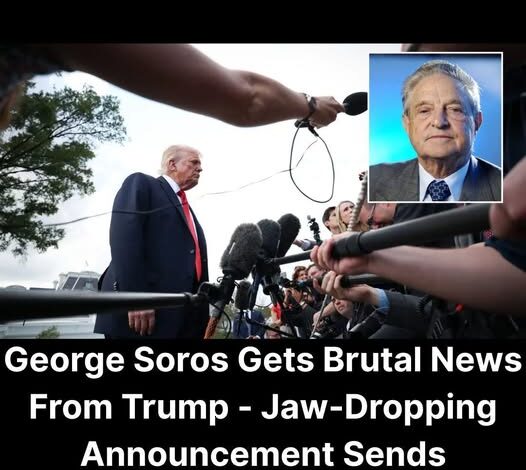
On Friday, President Donald Trump escalated his rhetoric against billionaire financier George Soros and his family, suggesting his administration may pursue racketeering charges under the RICO Act. The statement, made during an appearance on Fox & Friends, marks Trump’s most aggressive stance yet toward the longtime Democratic donor, who has long been a lightning rod for conservative criticism.
“We’re going to look into Soros,” Trump declared. “I believe that he and other people are guilty of RICO.” He accused Soros and his network of bankrolling civil unrest across the United States, claiming they orchestrated and funded protests not as acts of free expression but as coordinated operations designed to destabilize the country.
The RICO Act—short for the Racketeer Influenced and Corrupt Organizations Act—is a federal statute typically reserved for dismantling organized crime syndicates, such as the Mafia or large-scale drug cartels. It allows prosecutors to pursue individuals and organizations engaged in a “pattern of racketeering activity” carried out within a coordinated structure. By invoking RICO, Trump is signaling he views Soros-linked entities not merely as ideological opponents but as potential criminal enterprises.
This is not the first time Trump has targeted Soros, but it is by far the boldest. On his Truth Social platform, Trump has repeatedly described Soros and his son Alex as “psychopaths,” accusing them of funneling money into “violent protests” and “ripping America apart.” His latest comments expand on that rhetoric, suggesting not just moral condemnation but possible legal prosecution.
The allegations come at a politically charged moment. Trump connected his call for investigation directly to the recent assassination of conservative activist Charlie Kirk, who was fatally shot while speaking at Utah Valley University. Trump called Kirk’s death “political violence at its worst,” vowing to hold accountable not just the individual shooter but what he described as “the networks and enablers who fund political violence.” By linking Soros to Kirk’s murder, Trump is framing the case not as an isolated act but as part of a broader pattern of attacks on conservative voices.
The Soros family and their charitable network, the Open Society Foundations, swiftly rejected Trump’s claims. A spokesperson called the accusations “outrageous and baseless,” insisting that the foundation does not support or finance violent protests. For decades, the Open Society Foundations have poured billions into progressive causes, from criminal justice reform to press freedom and global democracy initiatives. Critics, however, have long accused the group of meddling in domestic politics and undermining traditional values.
George Soros, now 94, has been one of the Democratic Party’s most influential benefactors for over four decades. His son Alex, who has taken over leadership of the foundation, has stepped up his political involvement in recent years, frequently appearing alongside Democratic leaders and continuing his father’s philanthropic agenda. To conservatives, the younger Soros represents a seamless continuation of the family’s influence in U.S. politics.
Trump’s suggestion of a RICO probe ignited immediate debate. Legal experts were quick to point out that applying RICO in this context would be challenging. Prosecutors would need to prove not only that Soros-backed organizations supported protests but that they intentionally funded criminal activity as part of an ongoing enterprise. While some conservative commentators argue such a case could be made if evidence tied Soros funding directly to violent acts, the Justice Department has not announced any official investigation into Soros or his foundations.
Still, Trump’s comments reflect a broader strategy as he sharpens his “law-and-order” messaging ahead of the 2026 midterm elections. His campaign is leaning heavily into themes of security, accountability, and the need to confront what he calls “radical leftist billionaires” who, in his words, bankroll disorder. For Trump’s base, the prospect of holding Soros legally accountable resonates deeply, feeding into long-running suspicions about elite influence over protests, media, and policy.
Democrats, however, see Trump’s accusations as both reckless and dangerous. Several progressive figures criticized him for inflaming conspiracy theories that have, in the past, fueled harassment and threats against Soros and his family. They argue that Trump is weaponizing legal language for political gain, using RICO not as a prosecutorial tool but as a campaign talking point.
Whether Trump’s words translate into actual legal action remains uncertain. Without concrete evidence, the Justice Department is unlikely to pursue charges against Soros or his organizations. Yet politically, the impact is already clear. Trump’s attack has thrust Soros back into the spotlight, galvanizing conservatives while outraging progressives, and ensuring that the billionaire philanthropist remains a central figure in America’s culture wars.
In many ways, this latest clash reflects the broader battle lines of American politics. Trump is positioning himself as the defender of order against what he portrays as chaos funded by liberal elites. Soros, meanwhile, continues to embody—fairly or unfairly—the fears of conservatives who see progressive philanthropy as a Trojan horse for political manipulation.
As the nation reels from Charlie Kirk’s shocking death and braces for the political fights ahead of 2026, Trump’s vow to consider RICO charges against Soros marks a turning point. It may or may not result in legal action, but it has already reignited one of the most polarizing debates in American politics: who holds the real power, who pulls the strings, and how far leaders are willing to go to challenge their rivals.